 1993 Mitsubishi Eclipse I (1G, facelift 1992) Dimensions, Size & Specs
1993 Mitsubishi Eclipse I (1G, facelift 1992) Dimensions, Size & SpecsMeasurements of the 1993 Mitsubishi Eclipse I, engineered for optimal performance and comfort
| Dimensions | |
|---|---|
| Length: | 4390 mm172.8 in14.4 ft |
| Width: | 1695 mm66.7 in5.6 ft |
| Height: | 1306-1321 mm51.4-52.0 in4.3-4.3 ft |
| Trunk Capacity: | 195-289 liter6.9-10.2 cu ft |
| Weight Specifications | |
| Curb Weight: | 1153-1403 kg2542-3093 lbs |
| Tire Specifications | |
| Rims Sizes: | 14-inch rims:
|
| Tire Sizes: |
|
The Mitsubishi Eclipse I (1G facelift) from the 1993 model year is a versatile compact sports car available in both coupe and hatchback body styles, produced from 1992 to 1994. The vehicle measures 4390 mm (172.8 inches) in length and 1695 mm (66.7 inches) in width, making it a sleek and agile car suited for urban and spirited driving. Its height varies slightly, ranging from 1306 mm to 1321 mm (51.4 to 52.0 inches), depending on configuration. The curb weight of the Eclipse I spans from 1153 kg to 1403 kg (2542 to 3094 lbs), reflecting the differences in trims and equipment levels offered during this production period. The car's luggage capacity also varies between 195 liters (6.9 cubic feet) and 289 liters (10.2 cubic feet), accommodating modest cargo needs typical for compact sports coupes and hatchbacks. Rolling on rim sizes between 5.5J x 14 and 6J x 16, the Eclipse supports tire dimensions spanning from 185/70 R14 to 205/55 R16, providing good road grip and handling characteristics. This generation of the Mitsubishi Eclipse is valued for blending sporty aesthetics with practical dimensions, making it an appealing choice for enthusiasts seeking a distinctive yet manageable vehicle size.
Discover the standout features that make the 1993 Mitsubishi Eclipse I a leader in its class
Have a question? Please check our knowledgebase first.
The Mitsubishi Eclipse I (1G, facelift 1992) measures 4390 mm (172.8 inches) in length, 1695 mm (66.7 inches) in width, and has a height ranging between 1306 mm (51.4 inches) and 1321 mm (52.0 inches), depending on the specific model variant. These dimensions highlight its streamlined coupe and hatchback design that was popular in the early 1990s, offering a compact yet sporty footprint suitable for urban and highway driving while maintaining an aggressive stance on the road.
The curb weight of the 1993 Mitsubishi Eclipse I (1G, facelift 1992) ranges from 1153 kg (2543 lbs) to 1403 kg (3094 lbs). The variation in weight depends on factors such as the engine size, drivetrain layout (front-wheel drive or all-wheel drive in some trims), and additional equipment or trim levels. Lighter versions tend to enhance performance and fuel efficiency, while heavier variants may include more features or stability improvements.
The luggage capacity of the Mitsubishi Eclipse I (1G, facelift 1992) varies between 195 liters (6.9 cubic feet) and 289 liters (10.2 cubic feet), depending mainly on whether the model is a coupe or hatchback. The hatchback version generally offers more flexible cargo space as the rear seats can be folded down, increasing practicality for carrying larger items, whereas the coupe has a more limited trunk space due to its fixed rear window and sporty roofline.
Yes, the Mitsubishi Eclipse I (1G, facelift 1992) fits comfortably in a standard residential garage. Given its length of 4390 mm (172.8 inches), width of 1695 mm (66.7 inches), and height up to 1321 mm (52.0 inches), it is well within the dimensions of most average garage spaces which typically accommodate vehicles up to around 6 meters (20 feet) long and 2.5 meters (8.2 feet) wide. Its compact size makes parking and maneuvering in confined spaces easier compared to larger vehicles.
Compared to the pre-facelift Mitsubishi Eclipse (first generation original model from 1989 to 1991), the facelifted 1992-1994 Eclipse I (1G) maintains very similar dimensions, with the length remaining close to 4390 mm (172.8 inches), width at 1695 mm (66.7 inches), and height slightly varying between 1306-1321 mm (51.4-52.0 inches). The facelift focused more on styling and mechanical improvements rather than significant dimensional changes, preserving the compact coupe and hatchback body styles appreciated by enthusiasts.
The Mitsubishi Eclipse I (1G, facelift 1992) supports various tire and rim sizes including 5.5J x 14, 6J x 14, and 6J x 16 rims. Compatible tire sizes are typically 185/70 R14 and 205/55 R16. These size options allow owners to balance ride comfort and sporty handling according to their preferences. The standard tire widths and profile provide a good combination of grip and durability for the vehicle's sporty coupe and hatchback configurations.
The compact size of the Mitsubishi Eclipse I (1G) significantly contributes to its agile handling and sporty performance. With a length of 4390 mm (172.8 inches) and a relatively low height range of 1306-1321 mm (51.4-52.0 inches), the car has a low center of gravity that improves cornering stability. Narrow width (1695 mm / 66.7 inches) aids in responsiveness but may limit interior space slightly. This size balance made the Eclipse an appealing choice for drivers seeking spirited driving dynamics without sacrifices in everyday usability.
The Mitsubishi Eclipse I (1G, facelift 1992) offers reasonable interior space typical of compact coupes and hatchbacks from its era. While not as spacious as modern vehicles, it comfortably seats four passengers in a sporty configuration. Headroom and legroom are adequate but could be tight for taller occupants, especially in the rear seats. The luggage capacity between 195 and 289 liters (6.9 to 10.2 cubic feet) supports daily commuting and light travel needs, though extended cargo hauling is limited due to the compact car size and sporty body design.
When compared to contemporaries like the Toyota Celica (early 1990s models) or the Nissan 240SX/Silvia, the Mitsubishi Eclipse I (1G) occupies a similar dimensional profile. With a length of 4390 mm (172.8 inches), width of 1695 mm (66.7 inches), and height up to 1321 mm (52.0 inches), it ranks as a compact sports coupe with competitive dimensions. This size helped Mitsubishi position the Eclipse effectively within the affordable sports car segment, offering comparable size, weight, and agility to its rivals.
The Mitsubishi Eclipse I (1G, facelift 1992) comes equipped with rim sizes ranging from 5.5J x 14 inch to 6J x 16 inch, paired with tire sizes 185/70 R14 and 205/55 R16 respectively. Smaller rims with higher-profile tires tend to absorb road imperfections better, offering a more comfortable ride. Larger rims with lower-profile tires improve handling precision and provide a sportier feel, though at the expense of some ride comfort. These options allow drivers to tailor the car's dynamics to their preferences.
Discover similar sized cars.
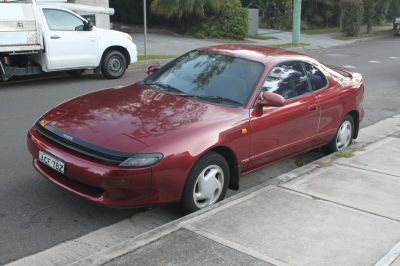
| Production: | 1989-1994 |
|---|---|
| Model Year: | 1990 |
| Length: | 4420 mm174.0 in |
| Width: | 1690 mm66.5 in |
| Height: | 1300 mm51.2 in |
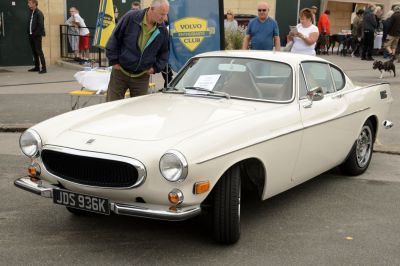
| Production: | 1969-1970 |
|---|---|
| Model Year: | 1970 |
| Length: | 4400 mm173.2 in |
| Width: | 1700 mm66.9 in |
| Height: | 1285 mm50.6 in |
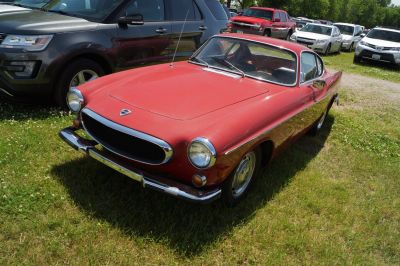
| Production: | 1963-1969 |
|---|---|
| Model Year: | 1963 |
| Length: | 4400 mm173.2 in |
| Width: | 1700 mm66.9 in |
| Height: | 1285 mm50.6 in |
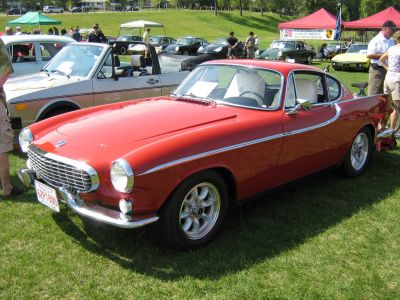
| Production: | 1961-1963 |
|---|---|
| Model Year: | 1961 |
| Length: | 4400 mm173.2 in |
| Width: | 1700 mm66.9 in |
| Height: | 1285 mm50.6 in |
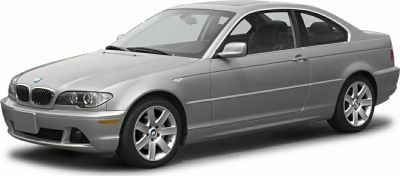
| Production: | 2003-2006 |
|---|---|
| Model Year: | 2004 |
| Length: | 4455-4488 mm175.4-176.7 in |
| Width: | 1947-1957 mm76.7-77.0 in |
| Height: | 1369 mm53.9 in |
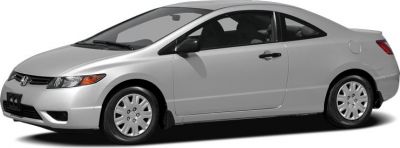
| Production: | 2005-2008 |
|---|---|
| Model Year: | 2006 |
| Length: | 4440 mm174.8 in |
| Width: | 1751 mm68.9 in |
| Height: | 1358 mm53.5 in |
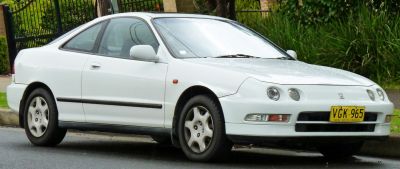
| Production: | 1994-2001 |
|---|---|
| Model Year: | 1994 |
| Length: | 4380 mm172.4 in |
| Width: | 1695-1710 mm66.7-67.3 in |
| Height: | 1290-1335 mm50.8-52.6 in |
